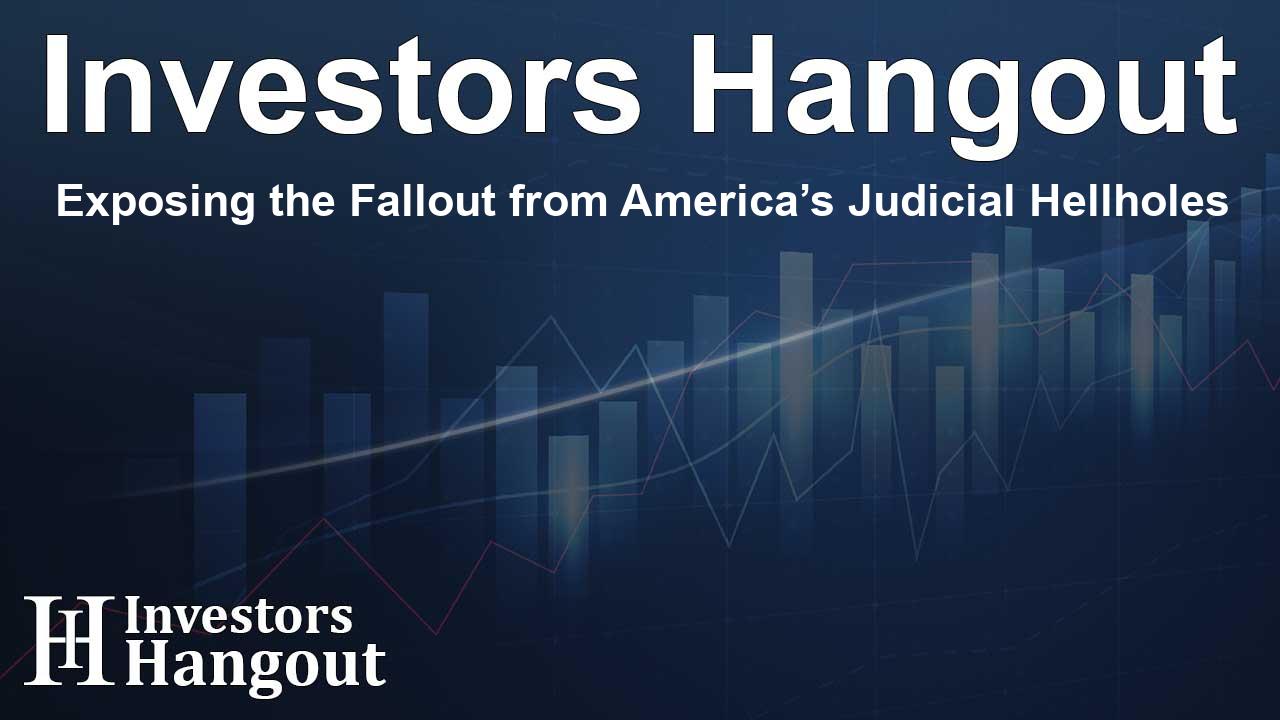Exposing the Fallout from America’s Judicial Hellholes

Understanding the Judicial Hellholes Report
Recently, the American Tort Reform Foundation published its comprehensive 2024-2025 report on America’s judicial system, uncovering troubling trends and alarming practices within various courts nationwide. Titled 'Judicial Hellholes', this report sheds light on the courts where lawsuit abuse is rampant, illustrating the consequences this has on the notion of fairness and justice in our civil justice system.
Judicial Hellhole Rankings and Their Implications
The report meticulously identifies the courts with the most concerning reputations, focusing on explosive trends like nuclear verdicts and the use of dubious science in legal proceedings. For instance, courts in Pennsylvania have maintained their position as the most problematic, while other states such as New York and South Carolina also garnered attention for their controversial practices. The inclusion of King County, Washington as a new entrant highlights a growing concern over how courts operate in relation to scientific evidence in high-stakes chemical exposure cases.
Top Judicial Hellholes
According to the report, the following are identified as the worst offenders:
- The Philadelphia Court of Common Pleas and the Pennsylvania Supreme Court.
- New York City courts that are currently facing a significant influx of questionable legal practices.
- South Carolina courts with ongoing controversies, especially concerning asbestos litigation.
- Georgia, California, Cook County in Illinois, and St. Louis are also highlighted for their troubling practices.
- The new emergence of King County, Washington raises concerns over judicial accountability.
- Lastly, Louisiana rounds out the list, showing prevalent issues within its legal framework.
The Rise of Excessive Verdicts
One of the most alarming patterns noted in the report is the rise of excessive jury awards, termed nuclear verdicts. These substantial payouts, sometimes reaching into the billions, undermine the very essence of remorse and justice that courts are supposed to uphold. Each of these verdicts not only affects the parties involved but also reverberates throughout the economy, leading to increased costs for consumers and businesses alike.
Economic Impact of Judicial Practices
Evidence shows that the hidden “tort tax,” which represents the economic burden inflicted by these legal practices, costs the average American over $1,500 annually. This is particularly significant when considering how it impacts families; a family of four can face an astronomical burden of more than $6,000 a year due to unnecessary litigation costs. This burden extends beyond individual households, contributing to a detrimental loss of jobs and livelihood, with over 4.8 million jobs reportedly negatively impacted each year as a result of excessive litigation.
Accountability in the Legal System
The report emphasizes the need for accountability among judges, politicians, and those within the legal profession who may exploit the system for personal gain. The American Tort Reform Association’s president, Tiger Joyce, remarked that the report acts as a call to action, highlighting the repercussions of uncontrolled litigation on economic growth. Recognizing these judicial hellholes is an essential step towards reforming the judicial system.
Emerging Trends in Litigation
New areas of litigation have emerged that further complicate the landscape of judicial abuse. Notably, cases regarding baby formula have been highlighted, with claims hinging on questionable scientific evidence. Such cases pose significant threats not only to the integrity of judicial outcomes but to public health, particularly regarding vulnerable infants who rely on these essential products. This unsettling trend indicates that challenges ahead must be carefully navigated to ensure consumer safety and legal accountability.
Conclusion and Future Outlook
The concerns raised in the Judicial Hellholes report demonstrate a pressing need for reforms within the legal system. The report serves as a crucial reminder of the adverse repercussions that arise from unchecked judicial practices. It also calls upon citizens to remain vigilant about the state of their judiciary, highlighting the importance of reforming underlying issues to safeguard the integrity of American law and justice.
Frequently Asked Questions
What is the Judicial Hellholes report?
The Judicial Hellholes report is a publication by the American Tort Reform Foundation that identifies courts where lawsuit abuse is prevalent.
Why are nuclear verdicts concerning?
Nuclear verdicts are concerning because they represent excessively high jury awards that can financially cripple industries and raise costs for consumers.
What impact do excessive tort costs have on the economy?
Excessive tort costs can lead to a hidden tax on consumers, job losses, and reduced economic growth.
How can individuals learn more about their local courts?
Individuals can research judicial performance reports and attend local court sessions to stay informed about their judicial systems.
What actions can be taken to address these issues?
Advocating for legislative reforms and increased transparency in the court system can help address the issues raised in the report.
About The Author
Contact Hannah Lewis privately here. Or send an email with ATTN: Hannah Lewis as the subject to contact@investorshangout.com.
About Investors Hangout
Investors Hangout is a leading online stock forum for financial discussion and learning, offering a wide range of free tools and resources. It draws in traders of all levels, who exchange market knowledge, investigate trading tactics, and keep an eye on industry developments in real time. Featuring financial articles, stock message boards, quotes, charts, company profiles, and live news updates. Through cooperative learning and a wealth of informational resources, it helps users from novices creating their first portfolios to experts honing their techniques. Join Investors Hangout today: https://investorshangout.com/
The content of this article is based on factual, publicly available information and does not represent legal, financial, or investment advice. Investors Hangout does not offer financial advice, and the author is not a licensed financial advisor. Consult a qualified advisor before making any financial or investment decisions based on this article. This article should not be considered advice to purchase, sell, or hold any securities or other investments. If any of the material provided here is inaccurate, please contact us for corrections.
